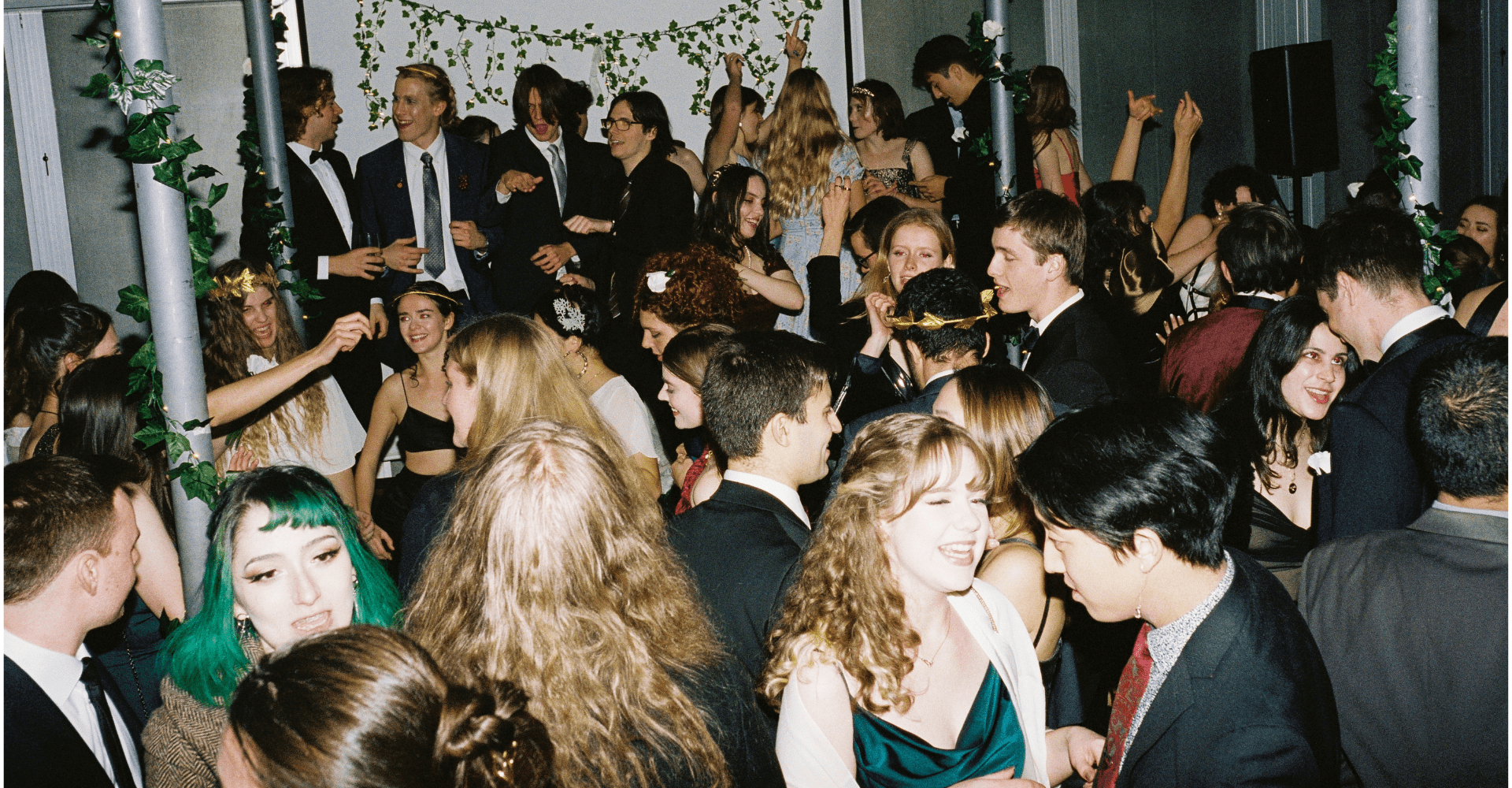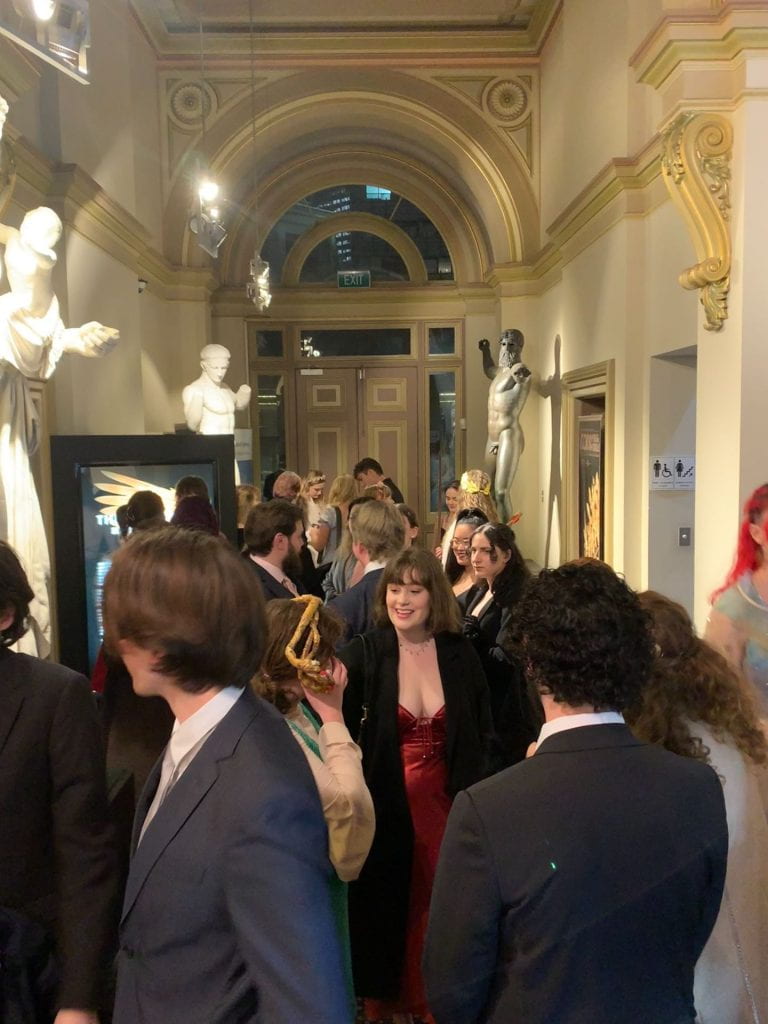
The SHAPS Hellenic Ball
This winter, SHAPS undergraduate student societies came together to embark on an ambitious and rewarding undertaking. Abigail Banister-Jones, Co-Consul/President of MUCLASS (Melbourne University Classics & Archaeology Student Society), reports on the inaugural SHAPS Ball below.
Where else does one throw a ball for classics, history and philosophy students but the Hellenic Museum? Surrounded by artefacts from the ancient world, and modern artworks inspired by Hellenic culture and myth, the celebration of all things SHAPS related could not have found a better home.
It all began at the 2021 AGM for MUCLASS, where a new committee was voted in. Classics student Meg Challis ran for the position of Treasurer on the campaign of holding a ball at the Hellenic Museum. Long after the committee had solidified their legacy with the club through the running of various competitions and social events, including but not limited to the iconic ‘Septathlon’ (praised in many a UniMelb Love Letter), this promise would be thrown out to possible first-year signups at Orientation week.
So now the promise had to be kept.

The Hellenic Museum is the only museum in Australia dedicated to the preservation and showcasing of Greek culture and art. Housed in the former Royal Melbourne Mint, just across from Flagstaff Station, the museum holds many educational events, classes, workshops and panels throughout the year, but this beautiful place is also host to events such as weddings, corporate conferences, and other extravagant affairs that cost a lot of money.
The museum was generous enough to allow us some discounts but, all the same, it was clear that the costs would be beyond the means of the average student budget. Luckily, MUCLASS has a longstanding alliance with the other SHAPS clubs: UniMelb History Society, Melbourne University Philosophy Society, and Chariot Journal. Together we would realise the tantalising prospect of a glamorous event with an ancient world twist.

The committees were determined to keep tickets to under $100, so this meant we had to raise funds to make this possible. We applied for joint grants to help cover the costs, and MUCLASS held an ancient-themed trivia night with a raffle, supported by UMSU grants.
Later, more money was raised through a benefit concert hosted at The Worker’s Club, entitled Ground Floor. It was a staged musical reading of a rock opera about the myths of Prometheus and Pandora, reimagined into a corporate context. It was written by me and performed by VCA students and graduates: Sinead Fernandes, Sebastian Angliss-Li, Lucas van Rhijn, Jimmy Drummond, Elliot Wood, Sol Rumble and Oliver Aryes. A fun night was had by all and highlights from the show can be found on the YouTube video below. And, of course, SHAPS was kind enough to lend the money to cover the deposit required by the museum.
The night arrived and ivy was strung up across the pavilion, rented pillars erected on the stage, and tiny plaster of Paris Venus de Milo statuettes decorated the tables. The evening began with a waltz through the museum itself, reminiscent of events such as the Met Gala, with everyone dressed to match the grandeur of both the building and its artefacts. Then, as the guests entered the pavilion with tickets in hand, they were greeted with a glass of sparkling wine on arrival. Now we had to celebrate the gods of course and, as the speeches were made, we also poured a libation to the Olympians, in particular Apollo (in the hope he wouldn’t send any plague arrows our way), Dionysus (for inspiring us to dance the night away) and, of course, the king and queen, Zeus and Hera (because goodness knows we didn’t want to offend them).


Now the crowd was free to mingle, dance, and take advantage of the canapés, which paid tribute to both the Greek and Roman themes, with a souvlaki station and a huge Italian grazing board. There was a sense of excess in the air and a giddiness that the dream that was sparked all those months ago had finally come to fruition.
As we all know here in the world of classics, the gods have a competitive edge to them (a certain ‘Judgement of Paris’ and subsequent ‘Trojan War’ comes to mind). Throughout the night the revellers were encouraged to vote for the wearer of their favourite/most thematic outfit, and in addition, a Caesar and Cleopatra were crowned (instead of prom king and queen).

MUCLASS also took the ball as an opportunity to present awards to winners of the Septathlon II, which had been running throughout the semester with symposiums, play recitations, charades, costumes and wargames. In Septathlon I, the team titled ‘Dionysus’s Peeled Grapes’ came second place – much to their dismay. In Septathlon II, they returned with vigour, naming themselves ‘The Grapes of Wrath’, and won the competition through a huge demonstration of commitment.


To celebrate the winners, SHAPS academics Dr Edward Jeremiah and Associate Professor KO Chong-Gossard read Latin and Greek victory odes respectively.
After the final thank-you speeches from the presidents of the various clubs, the night entered a world of pure dance – Dionysus was with us. Even after our time at the museum was over (and the committees had hurriedly packed away all the decorations), the party continued at the Carlton Club, where a huge taxidermy giraffe looked over the celebration as it faded out into the night.
At last, we could not forget to thank Meg Challis, our treasurer, with all the bravery of Herakles and the foresight of Prometheus.

 Abigail Banister-Jones is co-consul (president) of the Melbourne University Classics & Archaeology Student Society. She is a graduate of the BFA in Theatre at the VCA, and is the author of the novel Leda Kills the Swan.
Abigail Banister-Jones is co-consul (president) of the Melbourne University Classics & Archaeology Student Society. She is a graduate of the BFA in Theatre at the VCA, and is the author of the novel Leda Kills the Swan.